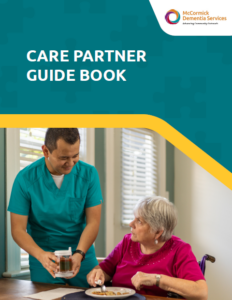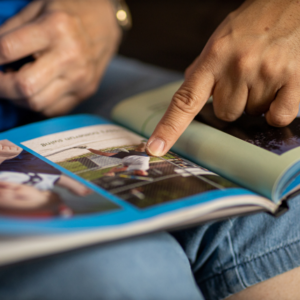What is McCormick Mobile?
McCormick Dementia Services has partnered with Western University to assess the impact of a new form of dementia care partner education. McCormick Mobile is a research project involving an intensive training program that occurs in the care partner’s home, with support from the McCormick Mobile interdisciplinary team.This program is designed to create highly personalized dementia care education focusing on communication strategies, simplified personal care, behavioural interventions and meaningful activities. This is all done with the care partner and the person whom they are caring for, which allows the team member to meet the individual needs of participants.
By conducting research when developing this program, we aim to demonstrate McCormick Mobile as an effective program to meet the following long-term goals:
- Demonstrate this as a successful means of providing care partners the tools to keep their person safe at home as long as possible
- Demonstrate the strength of interdisciplinary teams providing education
- Reduce Alternate Level of Care (ALC), prevent individuals from attending the Emergendy Department (ED) unnecessarily
- Partner with other organizations to have them implement this care partner education in their own community
- Receive permanent funding to continue the program
McCormick Mobile Pilot Design Features
- Mobile was co-designed with care partners, Western University researchers, and McCormick Dementia Services
- Adult learning principles were considered
- Resources were created specifically for McCormick Mobile, including:
- An interactive and printed Workbook with pages dedicated to goal setting
- Short videos demonstrating intervention techniques

What We’ve Done So Far:
- We’ve conducted an initial study where ten clients and their primary care partners completed the program in their own homes
- The initial participants completed a multi-week program where they had personalized visits from social workers, registered practical nurses, personal support workers and recreational specialists.
- Western University researchers are currently analyzing this data and results will be made available on our website when they are available.
What Do Our Community Members Think of McCormick Mobile?
“The response to McCormick Mobile has been exceedingly positive with care partners expressing appreciation for the one to one support and education they’ve received. Interacting with people in their home environments has provided the opportunity for an additional level of specialized services and a way to build ongoing connections. A win-win for all!” – Mobile Team Member
“With the success of McCormick Mobile, I hope to see the model continue to progress. By using the pilot project as a framework to develop other creative ways to meet individual needs and personalize supports, I believe we can include more families in the process. The value of interdisciplinary collaboration cannot be understated and will continue to be an avenue for McCormick Dementia Services to lead the way forward in our community and journey together.” – Mobile Team Member
“I think they’ve (Mobile team members) been excellent, I think all the different areas, the different folks that visited. You know the social worker, the recreational therapist, the nurse, all provided different insight. I lot of it I knew, from reading and attending different sorts of support groups. They did provide some different information, which was helpful.” – Mobile Participant
“I think it’s good (the training in our own home), I think it’s much more easier to communicate from your home and have somebody coming in and see what’s going on and having that person there with you and having the person get a feel for what the situation is. Being able to ask questions, have somebody there to be able to see what you’re dealing with. So I think it’s really good, I think it’s a good program.” –Mobile Participant

Next Steps
We are excited to announce that we will be running a second version of the McCormick Mobile Program! This will involve a multi-week program where care professionals, including social workers, registered practical nurses and recreational specialists provide personalized in-home education. We plan to begin the next iteration of McCormick Mobile in spring 2025.
Interested in Participating in the McCormick Mobile Program?
We are very excited to tell you more about this program and will be recruiting care partners and client groups who are currently either on the waitlist for or are attending the McCormick Dementia Services Day Program. Please send an email to research@mccormickcare.ca to inquire further and express your interest in the upcoming phase of the program. We look forward to hearing from you!
Looking for Care Partner Education Now?: Care Partner Education Video Series
Short, informative videos to help educate care partners.
A Special Thanks
Funding for McCormick Mobile phase 1 was made possible through generous support of the McCormick Care Foundation.
Funding for McCormick Mobile phase 2 was made possible through the generous support of a grant from the Petro Canada Care Makers Foundation.
Thank you to the Western University researchers participating in the project, including:
Dr. Marie Savundranayagam
Dr. Anne Garnett
To find out more information about future of McCormick Mobile – connect with research@mccormickcare.ca